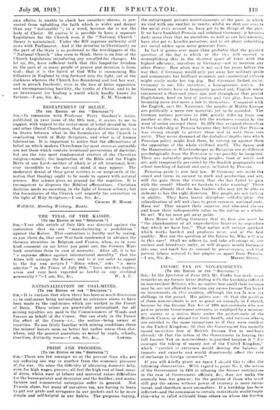PRIDE AND PROGRESS.
(To THE EDITOR or THE "SPECTATOR."] SIR,—There are few amongst us at the present time who are not suffering one way or another from the economic pressure °Ulm war. On some the difficulty of obtaining domestic help, even for high wages, presses; all feel the high cost of food, many of dress, whilst want of labour and material raises difficulties for the house-painter and decorator and the builder; and manu-
facture and commercial enterprise suffer in general. Not Prussia alone, but many of ourselves too, are having to learn to put our pride and arrogance in our pockets and to be more simple and self-helpful in our habits. The gorgeous luxury, the extravagant private entertainments of the past, in which we vied with one another in vanity, whilst we shut our eyes le the social evils around us, have got to be things of the past. If we have humbled Prussia and subdued Germany. it becomes daily more clear that we ourselves, as well as our late enemies, have also got to humble ourselves, and to set about rebuilding our social edifice upon more generous lines.
In fact it grows ever more than probable that the greatest question of the day is which of the two will succeed in accomplishing this in the shortest space of time, with the highest efficiency, ourselves or Germany—not to mention any other Power. How often was it not said for years before the war that, if Germany would only put away her military pride and armaments, her brilliant economic and commercial culture might easily make her top dog. But Germany lacked unity. Germany is not, like ourselves, a homogeneous nation. As German writers have so frequently pointed out, English unity commenced a thousand years ago, and throughout that period Englishmen, bred on love of justice and fair play, have been becoming more and more a law to themselves. Compared with the English, says Dr. Naumann, the peoples of Middle Europe are politically a mere, raw material, yet to be moulded. The German nations previous to 1866, greatly differing from one another as they do, had long felt the weakness created by the want of union amongst them. In 1870 they resigned themselves to the leadership of Prussia becauSe they believed that Prussia was strong enough to protect them and to weld them into unity. They never dreamed of the diabolical depths into which Prussian policy might lead them, by raising up against them the opposition of the whole civilized world. The Saxon and the Hanoverian or Wiirttemberger or Bavarian are as different psychologically from the Prussian as can possibly be imagined. These are naturally peace-loving peoples, fond of music and art, only temporarily perverted by the fiendish propaganda and school teaching of hatred and envy, initiated by Prussia.
Prussian pride is now laid low. If Germany sets aside the sword and turns in earnest to work and production and art, will she gain there the victory that she has failed to gain with the sword? Should we hesitate to take warning? There are signs already that she has leaders who may yet be able to indicate to her the right direction. Her people are not lacking in ability. They have learnt discipline:--selfAiscipline.- the subordination of self and class to great common, national end:. Have we? They respect their superior and educated cla::ses and know their indispensable value to the nation as a whole. Do we? We too must put away pride.
Herr Bauer is telling Germany that its first aim must be "the abandonment of all -uriproductive- luxuries to reproduce that which we have last." That nation will recover quickest which works hardest and produces most. and of time best quality. May not the question of the future be. Who will win in this race? Shall we adhere to, and take advantage of, out ancient and hereditary unity, or will despair mould Germany into one, and teach her to succeed by perseverance; and that patient labour natural to her people—as apart from Prussia.


































 Previous page
Previous page